- Home
- V. S. Naipaul
An Area of Darkness Page 2
An Area of Darkness Read online
Page 2
Now, sitting in the launch about to tie up at the Bombay pier where the names on cranes and buildings were, so oddly, English; feeling unease at the thought of the mute animal crouching on the floor at his master’s back, and a similar unease at the sight of figures – not of romance, as the first figures seen on a foreign shore ought to be – on the pier, their frailty and raggedness contrasting with the stone buildings and metal cranes; now I tried to remember that in Bombay, as in Alexandria, there could be no pride in power, and that to give way to anger and contempt was to know a later self-disgust.
*
And of course Coelho, guide, fixer, knower of government forms, was right. Bombay was rigorously dry, and my two opened bottles of spirit were seized by the customs officers in white, who summoned a depressed-looking man in blue to seal them ‘in my presence’. The man in blue worked at this manual and therefore degrading labour with slow relish; his manner proclaimed him an established civil servant, however degraded. I was given a receipt and told that I could get the bottles back when I got a liquor permit. Coelho wasn’t so sure; these seized bottles, he said, had a habit of breaking. But his own worries were over. There had been no general search; his Greek doll had passed without query. He took it and his fee and disappeared into Bombay; I never saw him again.
To be in Bombay was to be exhausted. The moist heat sapped energy and will, and some days passed before I decided to recover my bottles. I decided in the morning; I started in the afternoon. I stood in the shade of Churchgate Station and debated whether I had it in me to cross the exposed street to the Tourist Office. Debate languished into daydream; it was minutes before I made the crossing. A flight of steps remained. I sat below a fan and rested. A lure greater than a liquor permit roused me: the office upstairs was air-conditioned. There India was an ordered, even luxurious country. The design was contemporary; the walls were hung with maps and coloured photographs; and there were little wooden racks of leaflets and booklets. Too soon my turn came; my idleness was over. I filled in my form. The clerk filled in his, three to my one, made entries in various ledgers and presented me with a sheaf of foolscap papers: my liquor permit. He had been prompt and courteous. I thanked him. There was no need, he said; it was only a little paperwork.
One step a day: this was my rule. And it was not until the following afternoon that I took a taxi back to the docks. The customs officers in white and the degraded man in blue were surprised to see me.
‘Did you leave something here?’
‘I left two bottles of liquor.’
‘You didn’t. We seized two bottles from you. They were sealed in your presence.’
‘That’s what I meant. I’ve come to get them back.’
‘But we don’t keep seized liquor here. Everything we seize and seal is sent off at once to the New Customs House.’
My taxi was searched on the way out.
The New Customs House was a large, two-storeyed PWD building, governmentally gloomy, and it was as thronged as a court-house. There were people in the drive, in the galleries, on the steps, in the corridors. ‘Liquor, liquor,’ I said, and was led from office to office, each full of shrunken, bespectacled young men in white shirts sitting at desks shaggily stacked with paper. Someone sent me upstairs. On the landing I came upon a barefooted group seated on the stone floor. At first I thought they were playing cards: it was a popular Bombay pavement pastime. But they were sorting parcels. Their spokesman told me I had been misdirected; I needed the building at the back. This building, from the quantity of ragged clothing seen in one of the lower rooms, appeared to be a tenement; and then, from the number of broken chairs and dusty pieces of useless furniture seen in another room, appeared to be a junk-shop. But it was the place for unclaimed baggage and was therefore the place I wanted. Upstairs I stood in a slow queue, at the end of which I discovered only an accountant.
‘You don’t want me. You want that officer in the white pants. Over there. He is a nice fellow.’
I went to him.
‘You have your liquor permit?’
I showed him the stamped and signed foolscap sheaf.
‘You have your transport permit?’
It was the first I had heard of this permit.
‘You must have a transport permit.’
I was exhausted, sweating, and when I opened my mouth to speak I found I was on the verge of tears. ‘But they told me.’
He was sympathetic. ‘We have told them many times.’
I thrust all the papers I had at him: my liquor permit, my customs receipt, my passport, my receipt for wharfage charges, my Tourist Introduction Card.
Dutifully he looked through what I offered. ‘No. I would have known at once whether you had a transport permit. By the colour of the paper. A sort of buff.’
‘But what is a transport permit? Why didn’t they give it to me? Why do I need one?’
‘I must have it before I can surrender anything.’
‘Please.’
‘Sorry.’
‘I am going to write to the papers about this.’
‘I wish you would. I keep telling them they must tell people about this transport permit. Not only for you. We had an American here yesterday who said he was going to break the bottle as soon as he got it.’
‘Help me. Where can I get this transport permit?’
‘The people who gave you the receipt should also give you the transport permit.’
‘But I’ve just come from them.’
‘I don’t know. We keep on telling them.’
‘Back to the Old Customs,’ I said to the taxi-driver.
This time the police at the gates recognized us and didn’t search the car. This dock had been my own gateway to India. Only a few days before everything in it had been new: the sticky black asphalt, the money-changers’ booths, the stalls, the people in white, khaki or blue: everything had been studied for what it portended of India beyond the gates. Now already I had ceased to see or care. My stupor, though, was tempered by the thought of the small triumph that awaited me: I had trapped those customs officers in white and that degraded man in blue.
They didn’t look trapped.
‘Transport permit?’ one said. ‘Are you sure?’
‘Did you tell them you were leaving Bombay?’ asked a second.
‘Transport permit?’ said a third and, walking away to a fourth, asked, ‘Transport permit, ever hear of transport permit?’
He had. ‘They’ve been writing us about it.’
A transport permit was required to transport liquor from the customs to a hotel or house.
‘Please give me a transport permit.’
‘We don’t issue transport permits. You have to go to —’ He looked up at me and his manner softened. ‘Here, let me write it down for you. And look, I will also give you your code-number. That will help them out at the New Customs.’
The taxi-driver had so far been calm; and it seemed now that my journeys had fallen into a pattern that was familiar to him. I began to read out the address that had been given me. He cut me short and without another word buzzed through the thickening afternoon traffic to a large brick building hung with black-and-white government boards.
‘You go,’ he said sympathetically. ‘I wait.’
Outside every office there was a little crowd.
‘Transport permit, transport permit.’
Some Sikhs directed me round to the back to a low shed next to a gate marked Prohibited Area, out of which workers came, one after the other, raising their hands while armed soldiers frisked them.
‘Transport permit, transport permit.’
I entered a long corridor and found myself among some Sikhs. They were lorry-drivers.
‘Liquor permit, liquor permit.’
And at last I reached the office. It was a long low room at ground level, hidden from the scorching sun and as dark as a London basement, but warm and dusty with the smell of old paper, which was everywhere, on shelves rising to the grey ceiling, on
desks, on chairs, in the hands of clerks, in the hands of khaki-clad messengers. Folders had grown dog-eared, their edges limp with reverential handling; and to many were attached pink slips, equally faded, equally limp, marked URGENT, VERY URGENT, or IMMEDIATE. Between these mounds and columns and buttresses of paper, clerks were scattered about unimportantly, men and women, mild-featured, Indian-pallid, high-shouldered; paper was their perfect camouflage. An elderly bespectacled man sat at a desk in one corner, his face slightly puffy and dyspeptic. Tremulous control of the paper-filled room was his: at his disappearance the clerks might be altogether overwhelmed.
‘Transport permit?’
He looked up slowly. He showed no surprise, no displeasure at being disturbed. Papers, pink-slipped, were spread all over his desk. A table fan, nicely poised, blew over them without disturbance.
‘Transport permit.’ He spoke the words mildly, as though they were rare words but words which, after searching for only a second in the files of his mind, he had traced. ‘Write an application. Only one is necessary.’
‘Do you have the form?’
‘No forms have been issued. Write a letter. Here, have a sheet of paper. Sit down and write. To the Collector, Excise and Prohibition, Bombay. Do you have your passport? Put down the number. Oh, and you have a Tourist Introduction Card. Put down that number too. I will expedite matters.’
And while I wrote, noting down the number of my Tourist Introduction Card, TIO (L) 156, he, expediting matters, passed my documents over to a woman clerk, saying, ‘Miss Desai, could you start making out a transport permit?’ I thought I detected an odd pride in his voice. He was like a man still after many years discovering the richness and variety of his work and subduing an excitement which he nevertheless wished to communicate to his subordinates.
I was finding it hard to spell and to frame simple sentences. I crumpled up the sheet of paper.
The head clerk looked up at me in gentle reproof. ‘Only one application is necessary.’
At my back Miss Desai filled in forms with that blunt, indelible, illegible pencil which government offices throughout the former Empire use, less for the sake of what is written than for the sake of the copies required.
I managed to complete my application.
And at this point my companion slumped forward on her chair, hung her head between her knees and fainted.
‘Water,’ I said to Miss Desai.
She barely paused in her writing and pointed to an empty dusty glass on a shelf.
The head clerk, already frowningly preoccupied with other papers, regarded the figure slumped in front of him.
‘Not feeling well?’ His voice was as mild and even as before. ‘Let her rest.’ He turned the table fan away from him.
‘Where is the water?’
Giggles came from women clerks, hidden behind paper.
‘Water!’ I cried to a male clerk.
He rose, saying nothing, walked to the end of the room and vanished.
Miss Desai finished her writing. Giving me a glance as of terror, she brought her tall bloated pad to the head clerk.
‘The transport permit is ready,’ he said. ‘As soon as you are free you can sign for it.’
The male clerk returned, waterless, and sat down at his desk.
‘Where is the water?’
His eyes distastefully acknowledged my impatience. He neither shrugged nor spoke; he went on with his papers.
It was worse than impatience. It was ill-breeding and ingratitude. For presently, sporting his uniform as proudly as any officer, a messenger appeared. He carried a tray and on the tray stood a glass of water. I should have known better. A clerk was a clerk; a messenger was a messenger.
The crisis passed.
I signed three times and received my permit.
The head clerk opened another folder.
‘Nadkarni,’ he called softly to a clerk. ‘I don’t understand this memo.’
I had been forgotten already.
It was suffocatingly hot in the taxi, the seats scorching. We drove to the flat of a friend and stayed there until it was dark.
A friend of our friend came in.
‘What’s wrong?’
‘We went to get a transport permit and she fainted.’ I did not wish to sound critical. I added, ‘Perhaps it’s the heat.’
‘It isn’t the heat at all. Always the heat or the water with you people from outside. There’s nothing wrong with her. You make up your minds about India before coming to the country. You’ve been reading the wrong books.’
*
The officer who had sent me on the track of the transport permit was pleased to see me back. But the transport permit wasn’t enough. I had to go to Mr Kulkarni to find out about the warehouse charges. When I had settled what the charges were I was to come back to that clerk over there, with the blue shirt; then I had to go to the cashier, to pay the warehouse charges; then I had to go back to Mr Kulkarni to get my bottles.
I couldn’t find Mr Kulkarni. My papers were in my hand. Someone tried to take them. I knew he was expressing only his kindness and curiosity. I pulled the papers back. He looked at me; I looked at him. I yielded. He went through my papers and said with authority that I had come to the wrong building.
I screamed: ‘Mr Kulkarni!’
Everyone around me was startled. Someone came up to me, calmed me down and led me to the adjoining room where Mr Kulkarni had been all along. I rushed to the head of the queue and began to shout at Mr Kulkarni, waving my papers at him. He got hold of them as I waved and began to read. Some Sikhs in the queue complained. Mr Kulkarni replied that I was in a hurry, that I was a person of importance, and that in any case I was younger. Curiously, they were pacified.
Mr Kulkarni called for ledgers. They were brought to him. Turning the crisp pages, not looking up, he made a loose-wristed gesture of indefinable elegance with his yellow pencil. The Sikhs at once separated into two broken lines. Mr Kulkarni put on his spectacles, studied the calendar on the far wall, counted on his fingers, took off his spectacles and returned to his ledgers. He made another abstracted gesture with his pencil and the Sikhs fell into line again, obscuring the calendar.
Upstairs again. The clerk with the blue shirt stamped on Mr Kulkarni’s sheet of paper and made entries in two ledgers. The cashier added his own stamp. I paid him and he made entries in two more ledgers.
‘It’s all right,’ the officer said, scanning the twice-stamped and thrice-signed sheet of paper. He added his own signature. ‘You’re safe now. Go down to Mr Kulkarni. And be quick. They might be closing any minute.’
PART ONE
1. A Resting-Place for the Imagination
These Antipodes call to one’s mind old recollections of childish doubt and wonder. Only the other day I looked forward to this airy barrier as a definite point in our journey homewards; but now I find it, and all such resting-places for the imagination, are like shadows, which a man moving onwards cannot catch.
Charles Darwin: Voyage of the Beagle
YOU’VE BEEN READING the wrong books, the businessman said. But he did me an injustice. I had read any number of the books which he would have considered right. And India had in a special way been the background of my childhood. It was the country from which my grandfather came, a country never physically described and therefore never real, a country out in the void beyond the dot of Trinidad; and from it our journey had been final. It was a country suspended in time; it could not be related to the country, discovered later, which was the subject of the many correct books issued by Mr Gollancz and Messrs Allen and Unwin and was the source of agency dispatches in the Trinidad Guardian. It remained a special, isolated area of ground which had produced my grandfather and others I knew who had been born in India and had come to Trinidad as indentured labourers, though that past too had fallen into the void into which India had fallen, for they carried no mark of indenture, no mark even of having been labourers.
There was an old lady, a friend of my
mother’s family. She was jewelled, fair and white-haired; she was very grand. She spoke only Hindi. The elegance of her manner and the grave handsomeness of her husband, with his thick white moustache, his spotless Indian dress and his silence, which compensated for his wife’s bustling authority, impressed them early upon me as a couple who, though so friendly and close – they ran a tiny shop not far from my grandmother’s establishment – as to be considered almost relations, were already foreign. They came from India; this gave them glamour, but the glamour was itself a barrier. They not so much ignored Trinidad as denied it; they made no attempt even to learn English, which was what the children spoke. The lady had two or three gold teeth and was called by everyone Gold Teeth Nanee, Gold Teeth Grandmother, the mixture of English and Hindi revealing to what extent the world to which she belonged was receding. Gold Teeth was childless. This probably accounted for her briskness and her desire to share my grandmother’s authority over the children. It did not make her better liked. But she had a flaw. She was as greedy as a child; she was a great uninvited eater, whom it was easy to trap with a square of laxative chocolate. One day she noticed a tumbler of what looked like coconut milk. She tasted, she drank to the end, and fell ill; and in her distress made a confession which was like a reproach. She had drunk a tumbler of blanco fluid. It was astonishing that she should have drunk to the end; but in matters of food she was, unusually for an Indian, experimental and pertinacious. She was to carry the disgrace till her death. So one India crashed; and as we grew older, living now in the town, Gold Teeth dwindled to a rustic oddity with whom there could be no converse. So remote her world seemed then, so dead; yet how little time separated her from us!

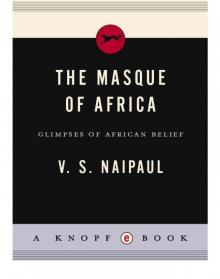 The Masque of Africa: Glimpses of African Belief
The Masque of Africa: Glimpses of African Belief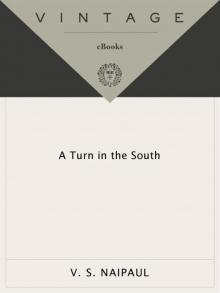 A Turn in the South
A Turn in the South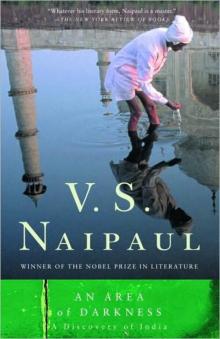 An Area of Darkness
An Area of Darkness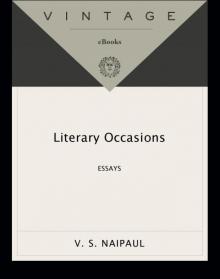 Literary Occasions: Essays
Literary Occasions: Essays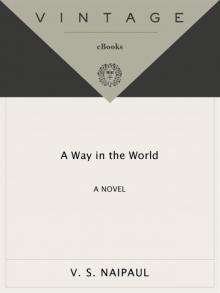 A Way in the World
A Way in the World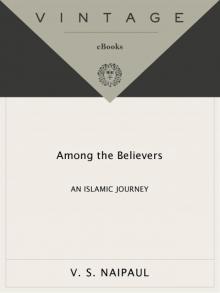 Among the Believers: An Islamic Journey
Among the Believers: An Islamic Journey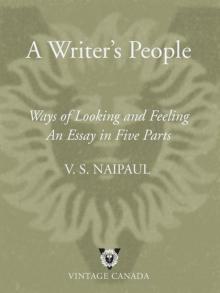 A Writer's People: Ways of Looking and Feeling
A Writer's People: Ways of Looking and Feeling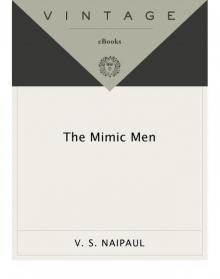 The Mimic Men: A Novel
The Mimic Men: A Novel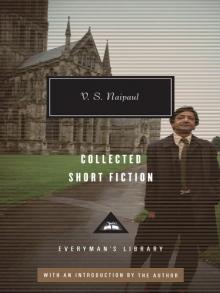 Collected Short Fiction
Collected Short Fiction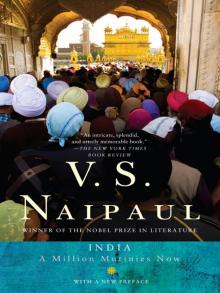 India: A Million Mutinies Now
India: A Million Mutinies Now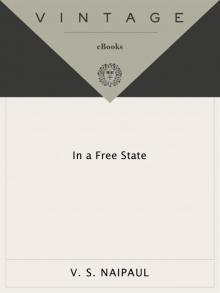 In a Free State
In a Free State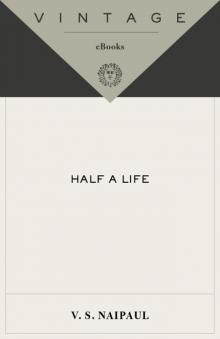 Half a Life
Half a Life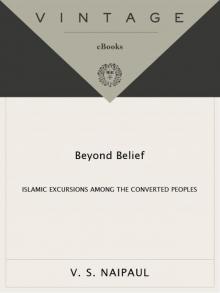 Beyond Belief: Islamic Excursions Among the Converted Peoples
Beyond Belief: Islamic Excursions Among the Converted Peoples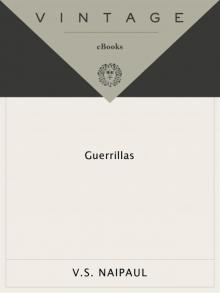 Guerrillas
Guerrillas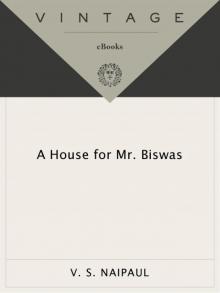 A House for Mr. Biswas
A House for Mr. Biswas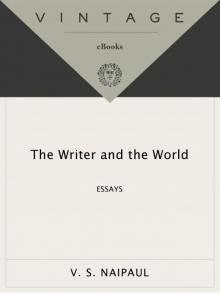 The Writer and the World: Essays
The Writer and the World: Essays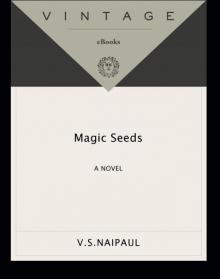 Magic Seeds
Magic Seeds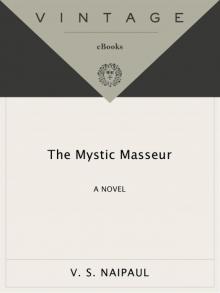 The Mystic Masseur
The Mystic Masseur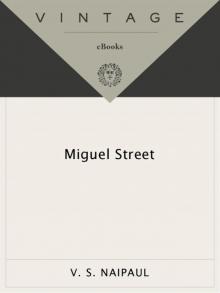 Miguel Street
Miguel Street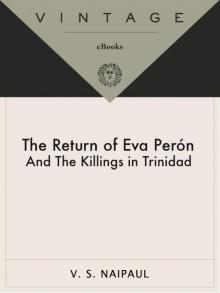 The Return of Eva Perón, With the Killings in Trinidad
The Return of Eva Perón, With the Killings in Trinidad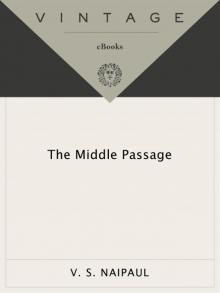 The Middle Passage
The Middle Passage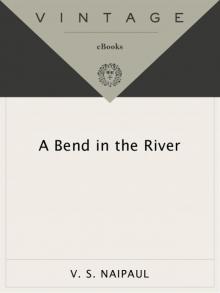 A Bend in the River
A Bend in the River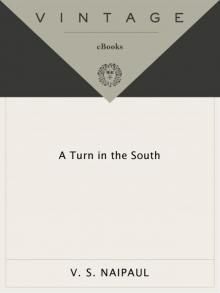 A Turn in the South (Vintage International)
A Turn in the South (Vintage International)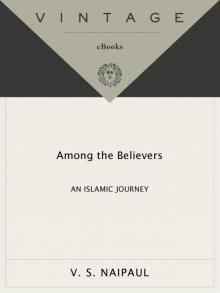 Among the Believers
Among the Believers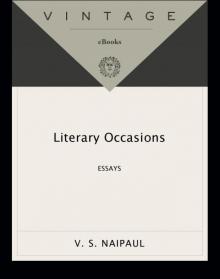 Literary Occasions
Literary Occasions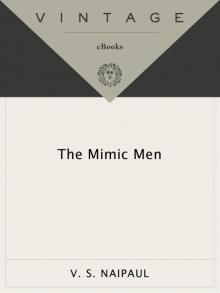 The Mimic Men
The Mimic Men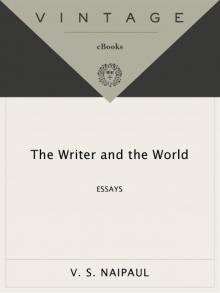 The Writer and the World
The Writer and the World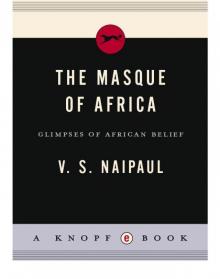 The Masque of Africa
The Masque of Africa